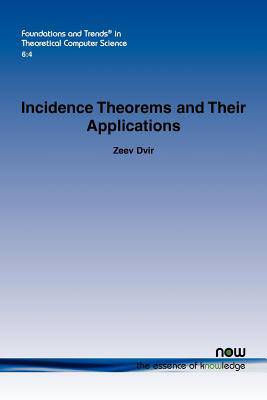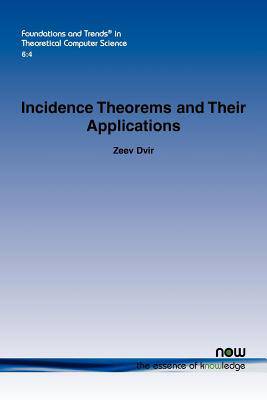
- Afhalen na 1 uur in een winkel met voorraad
- Gratis thuislevering in België vanaf € 30
- Ruim aanbod met 7 miljoen producten
- Afhalen na 1 uur in een winkel met voorraad
- Gratis thuislevering in België vanaf € 30
- Ruim aanbod met 7 miljoen producten
Zoeken
Omschrijving
Incidence theorems describe the way lines, points and other geometric objects intersect each other. Theorems of this sort have found a large number of exciting applications in the past few decades, both in mathematics and in theoretical computer science. Incidence Theorems and Their Applications presents some of the seminal results in this area as well as recent developments and applications. The presented results fall under three main themes. (i) Counting incidences: How many incidences can a set of lines have with a set of points? This basic question, and its generalizations, plays a role in proving various other theorems, some completely unrelated to geometry. (ii) Kakeya type problems: What is the 'best' way to arrange a set of lines, pointing in different directions, so that their overlap is maximized? Variations of this question appear in problems ranging from analysis and number theory to randomness extractors. (iii) Local to global problems: Suppose that, in a set of points, there are many small subsets that are dependent (for example, three points on a line). Can this information be used to give an upper bound on the dimension of the entire set? Problems of this kind are related to fascinating open problems in locally correctable error correcting codes. Incidence Theorems and Their Applications is aimed at both mathematicians and computer scientists and is suitable as a basis for a one semester course. Ideally, each chapter should be read from start to finish (the different chapters are mostly independent of each other).
Specificaties
Betrokkenen
- Auteur(s):
- Uitgeverij:
Inhoud
- Aantal bladzijden:
- 148
- Taal:
- Engels
- Reeks:
- Reeksnummer:
- nr. 20
Eigenschappen
- Productcode (EAN):
- 9781601986207
- Verschijningsdatum:
- 26/11/2012
- Uitvoering:
- Paperback
- Formaat:
- Trade paperback (VS)
- Afmetingen:
- 156 mm x 234 mm
- Gewicht:
- 217 g

Alleen bij Standaard Boekhandel
+ 257 punten op je klantenkaart van Standaard Boekhandel
Beoordelingen
We publiceren alleen reviews die voldoen aan de voorwaarden voor reviews. Bekijk onze voorwaarden voor reviews.











